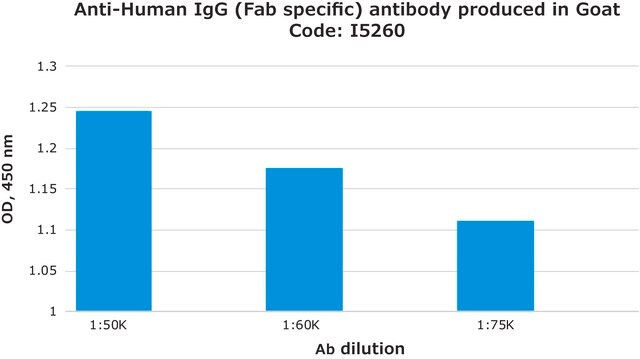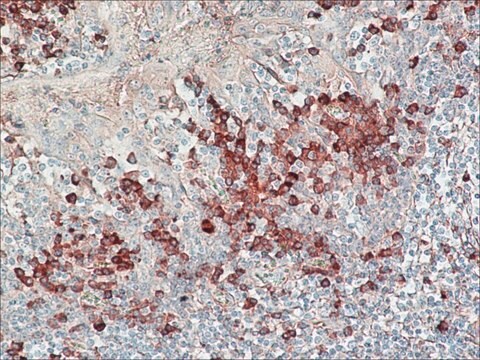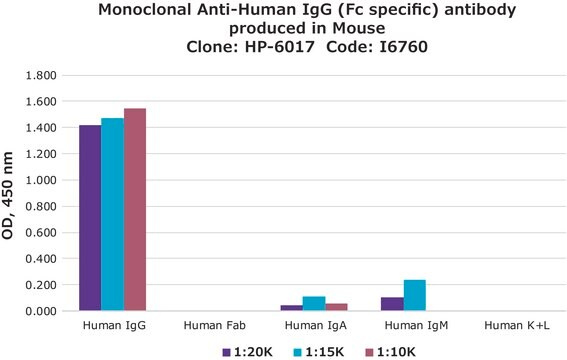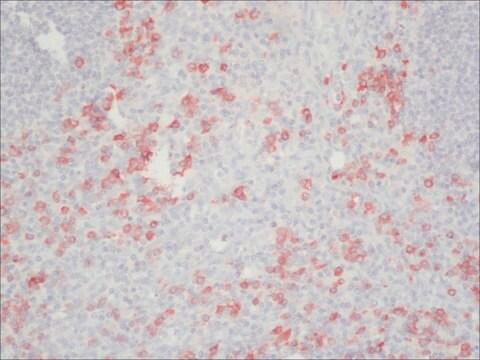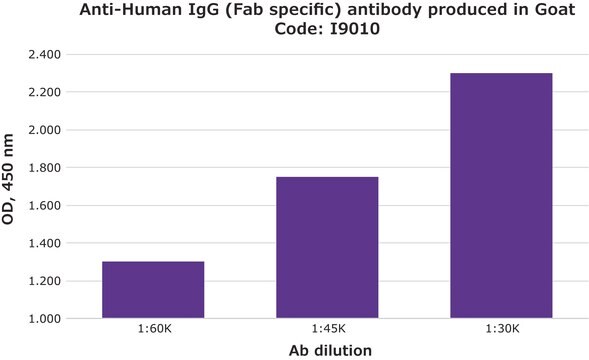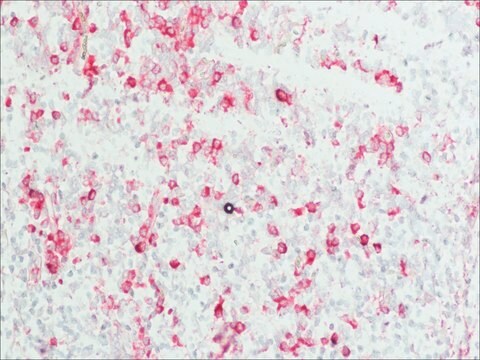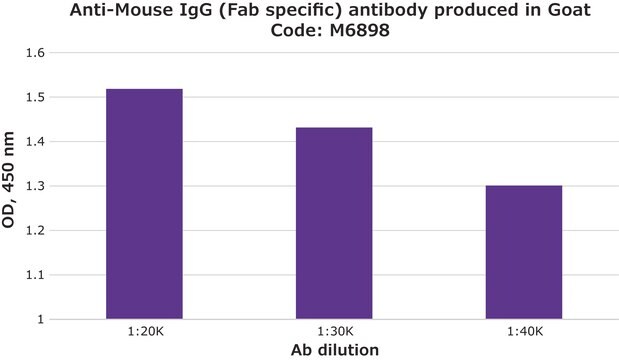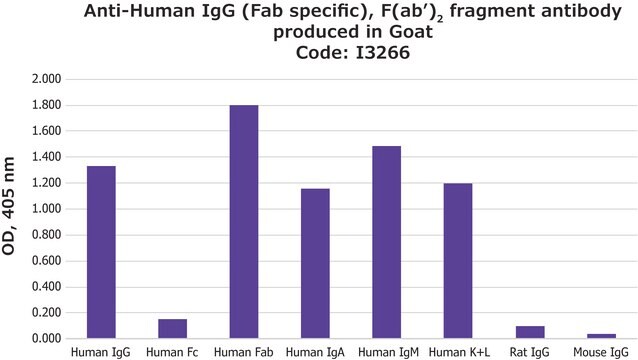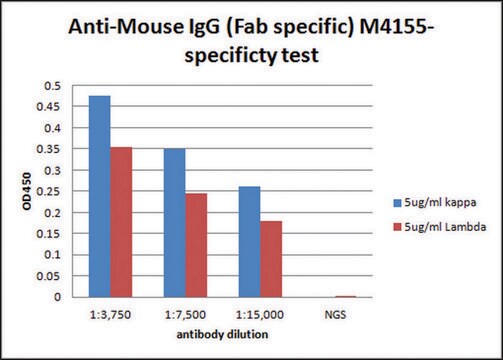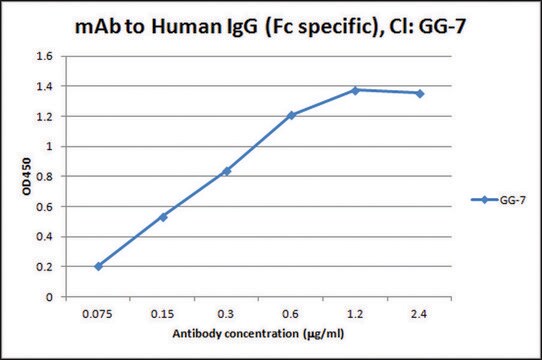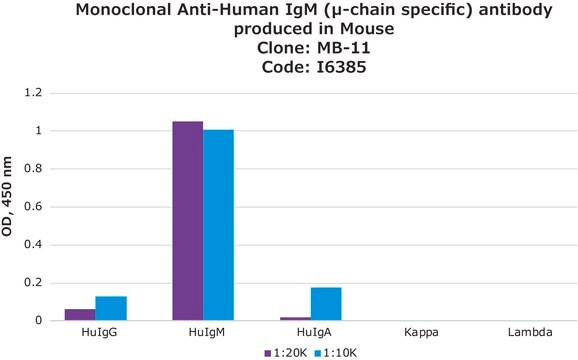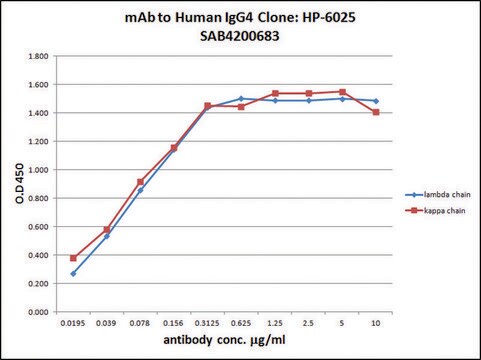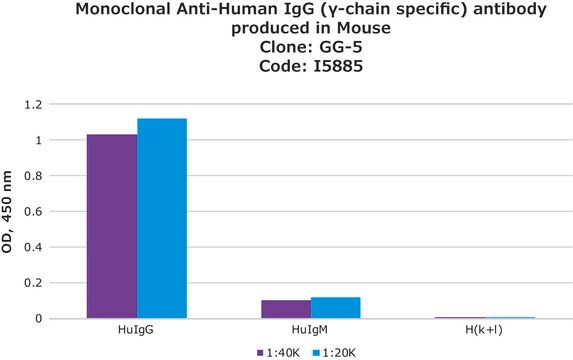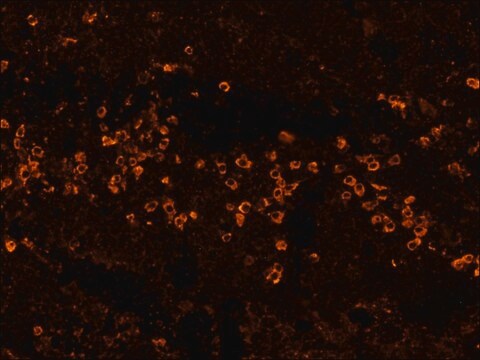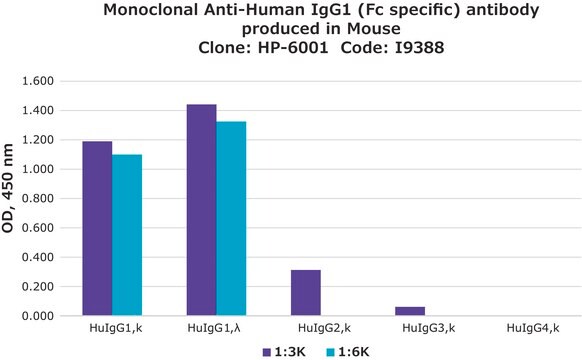I6135
Monoclonal Anti-Human IgG (Fab specific) antibody produced in mouse
clone GG-6, ascites fluid
Sign Into View Organizational & Contract Pricing
All Photos(1)
About This Item
Recommended Products
biological source
mouse
Quality Level
conjugate
unconjugated
antibody form
ascites fluid
antibody product type
primary antibodies
clone
GG-6, monoclonal
contains
15 mM sodium azide
technique(s)
indirect ELISA: 1:20,000
isotype
IgG1
shipped in
dry ice
storage temp.
−20°C
target post-translational modification
unmodified
General description
Human IgGs are glycoprotein antibodies that contain two equivalent light chains and a pair of identical heavy chains. IgGs have four distinct isoforms, ranging from IgG1 to IgG4. Monoclonal Anti-Human IgG (Fab specific) antibody is specific for the Fab fragment of human IgG. The antibody does not react with the Fc portion of human IgG.
Monoclonal Anti-Human IgG (Fab Specific) (mouse IgG1 isotype) is derived from the hybridoma produced by the fusion of mouse myeloma cells and splenocytes from an immunized mouse. Immunoglobulin G (IgG) is found in the blood. It is present in the human serum, secreted by the B cells. IgG has the lengthiest serum half-life compared to other immunoglobulins. Heavy and light chains of IgG are interconnected by disulfide bonds.
Specificity
Monoclonal Anti-Human IgG (Fab Specific) is immunospecific for human IgG. The antibody reacts with the Fab fragment of IgG.
Immunogen
Purified human IgG
Application
Monoclonal Anti-Human IgG (Fab specific) antibody produced in mouse has been used in enzyme-linked immunosorbent assay (ELISA).
Biochem/physiol Actions
Maternal IgG passes through the placenta to the fetus and confers immune defense of the neonate against infections. IgG is implicated in antibody-dependent cell-mediated cytotoxicity (ADCC) and also nullifies virus particles and toxins. Papain digestion of IgG generates fragment antigen-binding (Fab). Pepsin digestion of IgG produces fragment crystallizable (fc) fragment and a single dimeric F(ab)2.
These antibodies regulate immunological responses to allergy and pathogenic infections. IgGs have also been implicated in complement fixation and autoimmune disorders.
Physical form
The product is provided as ascites fluid with 0.1% sodium azide (see MSDS) as a preservative.
Storage and Stability
For continuous use, store at 0-5 °C. For extended storage, solution may be frozen in working aliquots. Repeated freezing and thawing is not recommended. Storage in "frost-free" is not recommended. If slight turbidity occurs upon prolonged storage, clarify by centrifugation before use.
Disclaimer
Unless otherwise stated in our catalog or other company documentation accompanying the product(s), our products are intended for research use only and are not to be used for any other purpose, which includes but is not limited to, unauthorized commercial uses, in vitro diagnostic uses, ex vivo or in vivo therapeutic uses or any type of consumption or application to humans or animals.
Not finding the right product?
Try our Product Selector Tool.
Storage Class Code
10 - Combustible liquids
WGK
nwg
Flash Point(F)
Not applicable
Flash Point(C)
Not applicable
Certificates of Analysis (COA)
Search for Certificates of Analysis (COA) by entering the products Lot/Batch Number. Lot and Batch Numbers can be found on a product’s label following the words ‘Lot’ or ‘Batch’.
Already Own This Product?
Find documentation for the products that you have recently purchased in the Document Library.
Customers Also Viewed
Ian P Hurley et al.
Forensic science international, 190(1-3), 91-97 (2009-07-07)
The detection and confirmation of bloodstains as being human in origin is important in crime scene investigations. There are a number of blood detection methods currently available. The aim of this work was to develop an assay capable of detecting
D M Kennedy et al.
Clinical and experimental immunology, 98(2), 245-251 (1994-11-01)
As elevated levels of glycated IgG have been detected in the plasma of patients with diabetes mellitus, a disease associated with increased susceptibility to infection, we have investigated whether glycation of MoAbs affects the kinetics and/or affinity of antigen binding.
Jin Qiu et al.
Proceedings of the National Academy of Sciences of the United States of America, 111(30), 11157-11162 (2014-07-12)
EBV is an oncogenic human herpesvirus that has the ability to infect and transform B cells latently in vitro. However, the virus also establishes a lifetime, benign, persistent latent infection in resting memory B cells in vivo, where the virus
Maria L Balmer et al.
Science translational medicine, 6(237), 237ra66-237ra66 (2014-05-23)
A prerequisite for establishment of mutualism between the host and the microbial community that inhabits the large intestine is the stringent mucosal compartmentalization of microorganisms. Microbe-loaded dendritic cells trafficking through lymphatics are arrested at the mesenteric lymph nodes, which constitute
D A van Kessel et al.
Clinical and experimental immunology, 177(1), 272-279 (2014-02-20)
Mannose-binding lectin (MBL)-deficiency is associated with an increased susceptibility to pneumococcal infections and other forms of disease. Pneumococcal vaccination is recommended in MBL-deficient patients with recurrent respiratory tract infections (RRTI). The response to pneumococcal vaccination in MBL-deficient individuals has not
Our team of scientists has experience in all areas of research including Life Science, Material Science, Chemical Synthesis, Chromatography, Analytical and many others.
Contact Technical Service